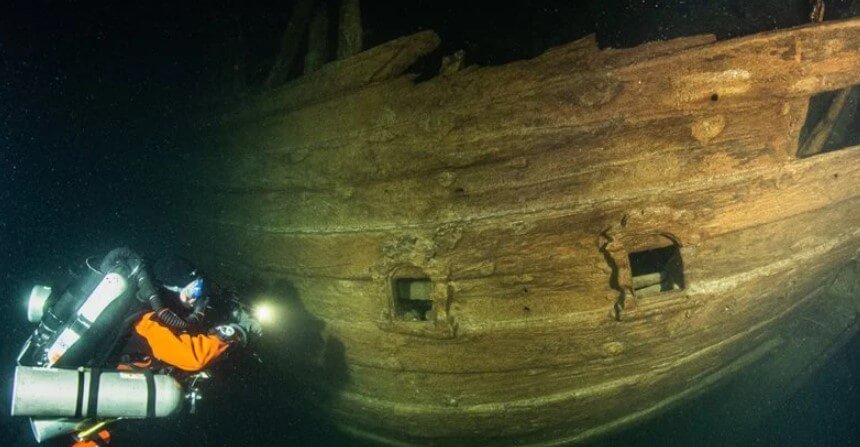कितनी अच्छी तरह एक जहाज है कि ४०० साल पहले डूब जीवित रह सकते हैं?
 Source:
Source:
Remains of a ship at the bottom of the Baltic Sea
Right now, while you're reading this article, somewhere in the depths of the seas and oceans lie sunken ships. Some of them are real "time capsules" because inside their cabins and cargo compartments are stored various objects that can reveal interesting historical facts. Many companies are looking for such ships, one of which is the non-profit organization Badewanne. For several years in a row divers manage to find under water ships of the First and Second World War. But recently, water depth explorers have found something amazing, namely a 17th-century Dutch ship. It has attracted a lot of attention in that it is perfectly preserved and in itself is unique. But what exactly is its peculiarity and how it was able to survive?
A shipwreck in the Baltic Sea
The new find of divers from the organization Badewanne was told in scientific . The ship, which sank 400 years ago, was found in the eastern waters of the Baltic Sea, at the very mouth of the Gulf of Finland. At a depth of 85 meters for several hundred years lay the so-called flute - one of the transport ships that was built in the Netherlands. They began to be built at the end of the 16th century and were revolutionary. The fact that these ships with three masts were small, but at the same time could carry large cargoes. Due to their payload capacity and compact size, they allowed to save not only on transportation, but also on maintenance. As a rule, the crew of flutes consisted of a small number of people.
This is what Dutch flute ships looked like hundreds of years ago
Causes of ship destruction
At least two factors affect the safety of sunken ships. First, the material from which the hull and the rest of the ship are made plays a big role. Metal vessels can lie underwater for hundreds of years and can only be covered with rust over time. But wooden ships can rot in just a few decades. Secondly, it is necessary to take into account the conditions in which the ship is located. The salinity of the water and its temperature play an important role - the higher these indicators, the less chance of good safety of the ship. Also, do not forget about the depth, because for greater safety it is important that the ship is not affected by the sun's rays.
Due to the peculiarities of the Baltic Sea, the ship is perfectly preserved
A cargo ship from the Netherlands, made of wood, lay in near-perfect conditions for four hundred years. It sank in the Baltic Sea region, where the salinity of the water is low and the temperature is insufficient for the reproduction of wood-eating bacteria and "shipworms". I mentioned them in the news about the discovery, which was also found at the bottom of the Baltic Sea. Thanks to cold and low-salt water, it also survived perfectly. In addition to these two ships, in 1956 in the Baltic Sea were found the remains of the ship swedish ship "Vasa", which once long ago capsized and sank due to an incorrect design.
Interesting fact - for the first time steering wheels (the steering wheel of ships) were used in Dutch ships
Historical mysteries
The cause of the sinking of the recently found ship remains unknown. Researchers have not yet been able to recognize it, but very soon they should succeed. They reported that various objects from the 17th century remained inside the vessel. In the course of their study they will be able to find out interesting facts about the lives of people of those times. Most likely, near the sunken ship lie and the remains of its crew members, but the scientists did not tell anything about them. At the moment, the discovery is interesting for at least two reasons. Researchers have found out that even 400-year-old ships can perfectly survive underwater. They also once again became convinced that the Baltic Sea holds many secrets. It is hard to imagine how much interesting lies on its bottom. But it is already possible to know in advance that historical objects should be well preserved, because the waters of the Baltic Sea can not harm them.
Sometimes ancient ships are found not under water, but under the earthen cover. And all because the appearance of our planet is constantly changing and where hundreds of years ago the water raged, now can be dry. In May 2020, my colleague Artem Sutyagin told about the discovery of a 1,000-year-old Viking ship. You can read about how well it is preserved and what it is interesting to science.
अधिक:
संबंधित समाचार
पारंपरिक दवा क्या है और क्या यह सुरक्षित है?
The effectiveness of traditional medicine and non-traditional treatments is disputed by many scientists As strange as they may seem, alternative medical practices are incredibly popular. The term "alternative therapy" refers to an...



















टिप्पणी (0)
इस अनुच्छेद है कोई टिप्पणी नहीं, सबसे पहले हो!